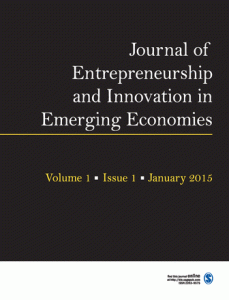What Really Determines an Individual’s Intent for Entrepreneurship?
 Setting up a business is the outcome of a long series of intricate choices. It is the process rather than the result of a distinct choice, and the entrepreneurial elements are not necessarily equal across the process’s different engagement levels. A recent article in the Journal of Entrepreneurship and Innovation in Emerging Economies discusses the factors that influence entrepreneurial intent as well as the relationship between an individual’s preliminary entrepreneurial intention of starting a business and the factors driving the same. Distinctions between several stages and engagement levels of the process have been recognized.
Setting up a business is the outcome of a long series of intricate choices. It is the process rather than the result of a distinct choice, and the entrepreneurial elements are not necessarily equal across the process’s different engagement levels. A recent article in the Journal of Entrepreneurship and Innovation in Emerging Economies discusses the factors that influence entrepreneurial intent as well as the relationship between an individual’s preliminary entrepreneurial intention of starting a business and the factors driving the same. Distinctions between several stages and engagement levels of the process have been recognized.
Article author Noel Saraf argues that before institutional factors such as financial markets, laws and regulations, and incentive schemes play a role in affecting an  individual’s decision to start a business, the decision is influenced by some intrinsic characteristics of the individual. This can appear in the form of gender, age, location, education, work experience or subjective perceptions. A striking outcome in India is seen in the case of gender, which shows no significant impact on the probability of business start-up, suggesting that both males and females are equally likely to have entrepreneurial intentions. It disproves the previously held notion among the common masses that the women entrepreneurship rate is low because they do not intend to expand beyond household barriers. This implies that greater attention should be paid to female nascent entrepreneurs during the start-up stage to help move their business to the next level.
individual’s decision to start a business, the decision is influenced by some intrinsic characteristics of the individual. This can appear in the form of gender, age, location, education, work experience or subjective perceptions. A striking outcome in India is seen in the case of gender, which shows no significant impact on the probability of business start-up, suggesting that both males and females are equally likely to have entrepreneurial intentions. It disproves the previously held notion among the common masses that the women entrepreneurship rate is low because they do not intend to expand beyond household barriers. This implies that greater attention should be paid to female nascent entrepreneurs during the start-up stage to help move their business to the next level.
The abstract:
The article analyses factors influencing entrepreneurial intent and studies the relationship between an individual’s preliminary entrepreneurial intention of starting a business and the factors driving the same, in India. Using a large sample of individuals, we investigate what variables are significantly correlated with the initial decision to start a business. We use a binomial logit model to test how individual characteristics, subjective perceptions, demographic and economic characteristics are correlated to the decision to start a new business. Our results suggest that part-time work experience and social network effects are the strongest in shaping entrepreneurial intentions. A striking outcome in India is seen in the case of gender, which shows no significant impact on the probability of business start-up, suggesting that both males and females are equally likely to have entrepreneurial intentions.
Click here to read “What determines Entrepreneurial intent in India?” for free from Journal of Entrepreneurship and Innovation in Emerging Economies! Make sure to sign up for e-alerts and be notified of all the latest research from Journal of Entrepreneurship and Innovation in Emerging Economies!































































































